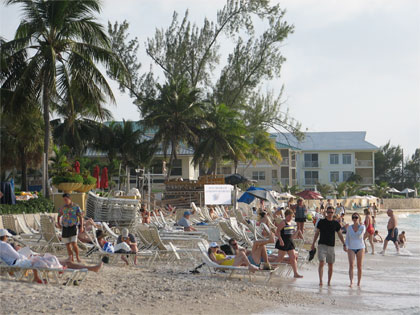Impacts of tourism
Tourism is one of the major industries in Grand Cayman. As has been seen, the industry has grown steadily over recent years, but there have been periods where the number of tourists visiting the destination has fallen. This has happened because of events such as hurricanes and the economic downturn, over which Grand Cayman has no control. As in all destinations, tourism has had some positive and negative impacts in Grand Cayman. A lot of the positive and negative impacts of tourism which have been experienced in other destinations are also occurring in Grand Cayman to a greater or lesser extent. These are summarised below.
Positive economic impacts
- Contributes to income and standard of living – tourism is one of the most important sectors of the Cayman Islands economy
- Improves local economy – many businesses are related to tourism in some way. This is called the indirect impacts of tourism
- Increases employment opportunities – many local people are employed in tourism
- Improves investment, development, and infrastructure spending – new roads, airport terminals and other developments have been built to provide for tourists
- Increases tax revenues – all tourists to Grand Cayman pay a daily tourist tax which can be spent by the government
- Creates new business opportunities – diving schools, sea fishing trips and other businesses relating to tourism have been set up.
Negative economic impacts
- Increases price of goods and services – this means that many local people have to pay higher prices for food and other goods
- Changing prices of land and housing – (increase in land is usually due to high demand and limited property supply.)
- The Economics and Statistics Office recorded a decline of 7.3% in the overall population in 2009. In the midst of the worldwide recession, employers were forced to lay off foreign workers, who make up most of the working-age group in the island.
- Increases potential for imported labour – not all of the people working in the tourism industry are from Grand Cayman. Hotels tend to bring in staff from other countries to fill many jobs.
- Seasonal tourism creates unemployment or under-employment issues – not all employees are employed for the whole year
- Profits may be exported by non-local owners – many of the hotels and resorts are owned by international or American companies. They are not owned by local people.
- Jobs may pay low wages – as in many destinations, some of the jobs in the tourism industry are poorly paid
Positive environmental impacts
- Protection of selected natural environments or prevention of further ecological decline – there are a number of new projects on Grand Cayman which are helping to protect the natural environment.
- Preservation of historic buildings and monuments – the National Trust of the Cayman Islands is working hard to protect important historic buildings and monuments
- Improvement of the area's appearance – most of the hotels and resorts are modern buildings which are designed to a high standard
- A "clean" industry – tourism produces relatively little pollution on Grand Cayman
Negative environmental impacts
- Pollution (air, water, noise, solid waste, and visual) – tourism has created some pollution on Grand Cayman, and some would argue that the hotels on Seven Mile Beach spoil the natural environment
- Loss of natural landscape and agricultural lands to tourism development – some land, especially along the coastline, has been lost to tourism development
- Destruction of flora and fauna – some natural plants have been threatened by the development of tourism facilities such as hotels.
- Water shortages – Grand Cayman must provide sufficient amounts of water to the hotels and resorts for swimming pools and watering golf courses, which use a great deal of water.
Positive social and cultural impacts
- Improves quality of life – it is certainly the case that the development of tourism has improved the quality of life for many of the residents of Grand Cayman.
- Positive changes in values and customs – it would be true to say that many of the visitors to Grand Cayman leave with a more positive impression of the Caribbean.
- Preserves cultural identity of host population – Attractions such as Pedro St James' Castle has helped visitors to understand more about the culture and heritage of Grand Cayman.
Negative social and cultural impacts
- Unwanted lifestyle changes – some people would argue that Grand Cayman has become too influenced by American culture, since many of the new restaurants and other facilities are American fast food chains.
- Displacement of residents for tourism development – there are some cases where local people have had to move to make way for tourism developments
- Exclusion of locals from natural resources – although most of the beaches are public, it is the case that large hotels do not encourage people who are not guests of the hotel to use the beach areas immediately in front of them.



